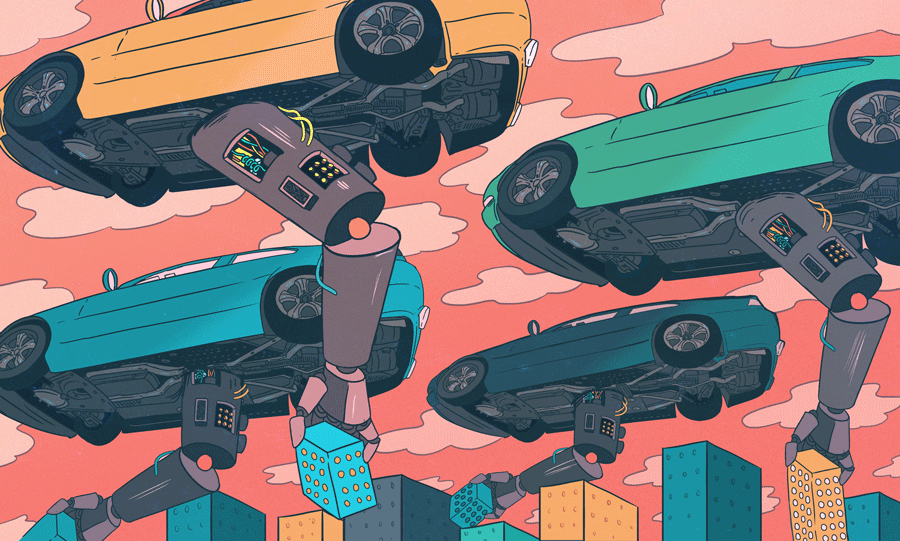You’re probably not the only one trying to squeeze in some last-minute shopping before the holidays. It seems that the SoftBank Vision Fund (SBVF) is in the same boat.
Follow Crunchbase News on Twitter
On Wednesday, Cambridge Mobile Telematics (CMT) announced that it has raised $500 million from the Vision Fund. The company did not disclose information about its valuation.
Typically, the Vision Fund invests in companies with already-sizable VC war chests. Cambridge Mobile Telematics breaks that mold; prior to this cash infusion by the Vision Fund, CMT had raised only one recorded round of prior funding. According to an SEC filing from September 2014, the company had secured at least $2.5 million of a targeted $17.5 million round of funding. No other public filings were available from the Securities And Exchange Commission. In an unusual move, a representative for the company would not provide further information about its prior funding history.
A statement from CMT said that the new capital will help the company expand its DriveWell business. DriveWell is CMT’s analytics platform, and as the brand name might telegraph, it’s meant to help people drive better.
Its mobile app scores drivers on safety and has been shown to produce lasting behavior change. The platform’s system of driving feedback, rewards, and peer-to-peer competition reduced phone distraction by an average 35 percent within 30 days, according to a statement from the company. At-risk speeding and hard braking went down by 20 percent, the company says.
Reducing risky behavior has the side benefit of saving money in the long run, which is why CMT licenses its technology and analytics platform to the insurance industry, large fleet managers, as well as “wireless carriers, and other entities,” according to a statement from the company. CMT’s website says it can take a white-labeled app with social leaderboard and driver scoring features to market in less than 90 days. CMT says it has worked with a global base of insurers including State Farm, Liberty Mutual, Desjardins, Discovery, Admiral, AIG, and Insurance Australia Group, among others.
So how does it all work on the back end? According to information on the company’s website, the DriveWell platform consists of three layers. It first ingests raw telematics data streaming off the car’s computer, as well as video data from dash cams. Then, according to CMT, it incorporates and processes this data to “generate accurate metrics and identify roads and road characteristics.” Finally, based on its big dataset of driver behavior, CMT uses machine learning to “infer key contextual and behavioral details or a comprehensive understanding of driver behavior and risk.”
The company discovered that there’s money to make in that last step. Initially founded in 2010 and incubated out of MIT’s Computer Science and Artificial Intelligence Lab (CSAIL), the company launched the first service to gather and process incoming sensor data from phones for auto insurance applications in 2012.1 It added the distraction detection and gasification features over the subsequent two years. Its IoT device, the DriveWell Tag, was invented in 2014 as a way for fleet managers to get deeper access to driving events data and detect collisions.
CMT is just the latest entry in the SoftBank Vision Fund’s ledger of other data-driven automotive investments. The Vision Fund invested in San Diego-based autonomous navigational technology developer Brain Corp back in July 2017. Alongside General Motors, SBVF also invested in a $3.4 billion corporate venture round closed by Cruise Automation in May 2018, the self-driving tech company GM acquired for $1 billion back in 2016.
On Thursday, the Wall Street Journal reported that the SoftBank Vision Fund led a $385 million funding round raised by Fair, a car leasing company.
Although Cambridge Mobile Technologies doesn’t mention self-driving or autonomous vehicles on its website, its data could be beneficial to developers of the next generation of autonomous vehicle technologies. But in the meantime, before AI is in full control of the in-car experience, it can serve as a backseat driver.
Illustration: Li-Anne Dias
Back in April, Crunchbase News profiled the work of UChicago computer systems scientist Hank Hoffmann, who was also at CSAIL around the same time Cambridge Mobile Telematics was getting started.↩

Stay up to date with recent funding rounds, acquisitions, and more with the Crunchbase Daily.





![Illustration of stopwatch - AI [Dom Guzman]](https://news.crunchbase.com/wp-content/uploads/Halftime-AI-1-300x168.jpg)




67.1K Followers